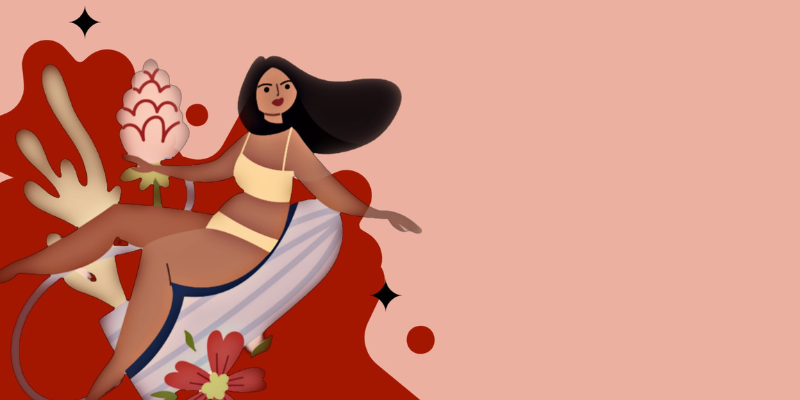Research project
Stigma and Shame? Challenging Menstrual Taboo Through Time
- Start date: 1 October 2022
- End date: 31 July 2023
- Funder: Leeds Arts and Humanities Research Institute
- Primary investigator: Dr Rae Gillibrand
- Co-investigators: Dr Katie Carpenter

Description
How did people experience menstruation in the past? How has menstrual stigma developed and what can we do to challenge this
This collaborative and community-engaged project facilitated historically-informed conversations about menstruation and the present-day issues surrounding it. Given that menstruation is considered by many people to be a taboo, we see history as a much-needed safe space to stimulate discussion, share experiences, and inspire collaboration.
At the intersection of histories of health, gender and culture, this project gathered archival materials, worked towards menstrual de-stigmatisation by networking with community partners, and hosted freely accessible public events in the North of England.
Menstruation in the archive
Research assistants Sophie Turbutt, Claire Turner and Emily Gerber delved into the archives to see what we might learn about the history of periods and their stigmatisation.
Their research spanned the Brotherton Special Collections, West Yorkshire Archives, Thackray Museum of Medicine, Wellcome Collection, Medical Heritage Library, Old Bailey Online, and beyond. From period pad patents to vaginal whirling sprays, from books of herbal remedies to tabloid scoops claiming to cure PMS, they unearthed a wealth of fascinating material relating to the ways in which people experienced, managed, spoke about and wrote about menstruation in the past.
The history of menstruation has never been only about periods: it opens up bigger questions about our bodies and our autonomy over them.
Tactility and Materiality
We can see from early modern medical treatises that tactility was especially important in the way people used to handle menstruation. The movement of humours between the internal body and its surroundings – including via the skin – needed to be controlled to maintain good, balanced menstrual health. These texts also demonstrated a curiosity about natural variation in individuals’ experiences of menstruation: for instance, many early modern writers connected differences in climate (heat and humidity) to the frequency with which someone might get their period. The materiality of periods remains important today of course, as manufacturers develop ever newer products to contain and dispose of menstrual blood. From the first sanitary towels in the late nineteenth century to the most recent menstrual cup designs, these objects’ relevance to questions of discretion and privacy can indicate how people experience – and experienced – the (de)stigmatisation of periods.
Menstrual Stigma
Literary advice-giving about periods can tell us much about the specific ways in which menstruation has been stigmatised in the past and present. For example, authors of advice books aimed at young women and their mothers in the late nineteenth and early twentieth centuries often framed themselves as wise older women disclosing secret information. Discussion of intimate body parts was portrayed as subversive and taboo, probably in many cases to increase the titillating appeal of the quack medicines advertised in the texts. Moving into the late twentieth century, one can identify bursts of tabloid sensationalism in matters pertaining to menstruation, from period pain to PMS. Menstruation – and those who menstruated – were blamed for all sorts of social ills
Menstruation as Metaphor
We can also see, in books of home remedies from the early modern period through to the nineteenth and twentieth centuries, an overlap in the way people have historically conceived of handling menstruation and pregnancy. To ‘bring on your menses’ could be to terminate an unwanted conception.
Read More
- Rachael Gillibrand, ‘‘Dirty Red’: How periods have been stigmatised through history to the modern day’, The Conversation (22 August 2023).
- Rachael Gillibrand and Katie Carpenter, ‘Challenging Taboo: why it’s time to put periods in plain sight’, University of Leeds Medium (8 March 2023).
Events
- Creative Flow: A Menstrual Crafts & History Workshop
- In this workshop, Rachael Gillibrand and Katie Carpenter brought together seminar-style history sessions and creative craft activities to encourage open conversation about menstruation and menstrual stigma.
- Periods of Periods: A Bloody Quick History of Menstruation
- Speaking as a part of the Leeds University Wellness Week programme, Katie Carpenter delivered a lecture on the history of menstruation.
- Medieval Menopause and Herbal Lumens
- Working in collaboration with Marge Bradshaw’s Arts Council England-funded ‘Whose Menopause?’ project, Rachael Gillibrand delivered a workshop for an LGBTQ+ focus group, bringing together medieval understandings of menstruation with Marge Bradshaw’s lumen printing workshops. Read Marge Bradshaw’s reflections on the workshop.

